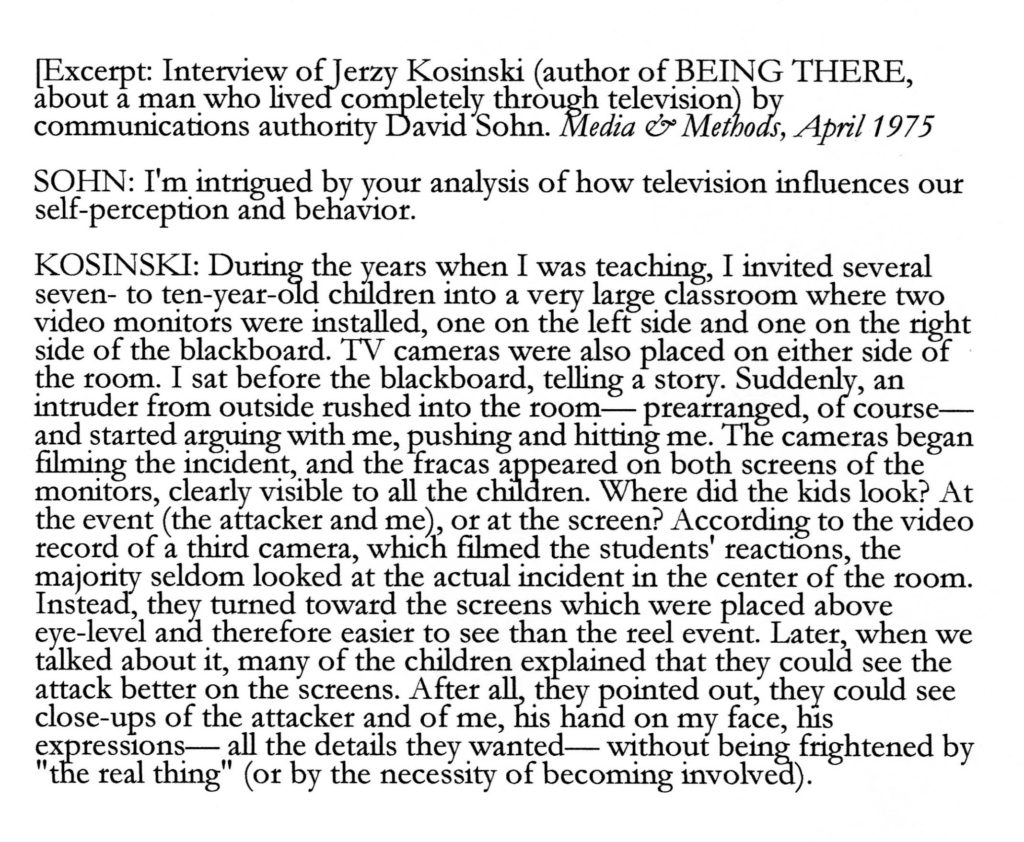Note: Continuing the theme indulged in the short fictional piece offered in the archives, Fido TV, this post takes another look at television and its effects. Fido TV can be found at an address on this site which sounds like chapter and verse: 22 Jan 2016, in the more fanciful category of Versifixion. Simply stated: Versifixion, 22 Jan 16.
FANTASECTOMY
☞ ☞ ☞ At the beginning of the seventh decade of the twentieth century, I was granted a vision into the future by visiting a farmhouse in Wisconsin. A newer house, all of brick and hardwood floors and very spiffy for a Midwestern farmer. Probably not lived in much. That might have been the reason, or so I thought, that there was something strange about it. Strange, I soon realized, was that not a lick of reading material could be seen. No newspaper. Magazines, nada. Not even an old frayed copy of Reader’s Digest or National Geographic. Didn’t give it much thought until the next morning, which was Saturday. Having been holed up as a poor student sans TV, plus minus kids around, I was unaware of that vast cultural fermentation of Saturday morning television. My ignorance prepared me for the vision.
Down the hall for morning coffee, it was not with thunderous steps I made my way to the kitchen. Merely on padded feet did I turn a corner into the den— and the new millennium. It was actually into a room full of small staring faces I entered. But the faces… They were totally ensnared by the blue light flickering off them. Small faces, kids gathered from the neighborhood, sprawled and utterly transfixed. Gaining a view of the screen, I beheld the Monkees: young musicians costumed the same as their group name and playing the kind of rock and roll dubbed “bubblegum.” Every scene quick-clipped and saturated by ads for sugared breakfast flakes. We all know the drill by now, but for me it was a brave new world.
Utterly transfixed really doesn’t seem to cover it. The kids so mesmerized as I passed through the den it was immediately obvious they had no idea someone, a stranger no less, was presently standing and staring at them as they stared at the Trix rabbit. Didn’t matter. Even if I were brandishing an axe or aiming a gun or even dropping my pants, not one of those pixilated tykes would have cocked an eye in my direction. They were busy gobbling.

But what were the children really gobbling? On the surface it seemed they were only preparing to devour frosted flakes. Marshal McLuhan had only recently prophesied it then, but it has rung down through the decades. The medium is what they were gobbling. That was the message.
They were watching then, and, as grandparents now, they’re still watching a current Cyclops version of The Emperor’s New Clothes… The Emperor’s New Policies. The Empress’ New Fashions For Girls. New Trends For Old Emperors. Execution of the Emperor’s Tailors. The Emperor Is Actually African. No matter what might be the title, however, it’s all divine mutton shepherded by the Cyclops Noble Network.
 ☞ In the old tale the Cyclops was gigantic even as a baby. The sounds this new millennium Cyclops made soon after its birth were also unmistakable. Sounds that came from the audible end of the hallway of that Wisconsin farmhouse, a screetchy scratchy mix of happy happy commercial jollity on a Saturday morning. Divine mutton.
☞ In the old tale the Cyclops was gigantic even as a baby. The sounds this new millennium Cyclops made soon after its birth were also unmistakable. Sounds that came from the audible end of the hallway of that Wisconsin farmhouse, a screetchy scratchy mix of happy happy commercial jollity on a Saturday morning. Divine mutton.
☞ In Homer’s world the race of one-eyed Cyclops were the shepherds of the gods. So we could consider their mutton divine. When Ulysses and his crew were trapped in the cave of Polyphemus, the one-eyed giant began eating them one by one. The way the wily Ulysses was able to sneak out of the murderous cave was to disguise himself and his crew as sheep. And that was after they blinded  Polyphemus so that all he could do was feel the sheep skin over the crouching bodies crawling out of that bloody cave. We might call it a metaphor of those people today who do not revere an interest in divine mutton television, but pretend to do so.
Polyphemus so that all he could do was feel the sheep skin over the crouching bodies crawling out of that bloody cave. We might call it a metaphor of those people today who do not revere an interest in divine mutton television, but pretend to do so.
☞ In that delightfully kitsch film of Ulysses with Kirk Douglas, one of the most amusing sequences occurs with Ulysses and crew trapped in the cave of the Cyclops, Polyphemus. In it, the audience is treated to one of the greatest cheesy lines in filmdom. Polyphemus declares, dashing the brains of one Greek sailor against a wall and eating him: “These Greeks are stringy.” The current Polyphemus— call him Sony— might say of his fare: “These American brains are spongy. They soak up everything I show them.” In a metaphorical way the Cyclops is devouring the brains of your children. The process is called here Fantasectomy.
 ☞ Fantasectomy was in full flower by the time Mr. Rogers strolled into his den, put on his cardigan, and greeted all his “neighbors.” He merely wanted to be your friend. And he was. He taught his young viewers things, especially how to be good. And Mr. Rogers was good. He, like Captain Kangaroo, had served valiantly in WW II, and it was clear he was happy to make the children happy. Along with his cohorts, he was obviously sincere about entertaining. Yet it was that mild-mannered Mr. Rogers who helped released the demons. How was he to know? Who could blame him for unwittingly aiding and abetting the Cyclops in devouring the brains of the children?
☞ Fantasectomy was in full flower by the time Mr. Rogers strolled into his den, put on his cardigan, and greeted all his “neighbors.” He merely wanted to be your friend. And he was. He taught his young viewers things, especially how to be good. And Mr. Rogers was good. He, like Captain Kangaroo, had served valiantly in WW II, and it was clear he was happy to make the children happy. Along with his cohorts, he was obviously sincere about entertaining. Yet it was that mild-mannered Mr. Rogers who helped released the demons. How was he to know? Who could blame him for unwittingly aiding and abetting the Cyclops in devouring the brains of the children?
☞ About ten years after the Wisconsin farm house incident, I visited the home of a friend. Inside, the teen son and his buddy were sprawled in the darkened living room on a beautiful sunny spring day, which seemed like Strike one. They were watching Mr. Rogers. Strike two. Strike three occurred when Mr. Rogers invited watchers to imagine a horse.
I jumped right in. I recalled my Uncle Pete’s Appaloosa, then a childhood pony ride at a carnival… Didn’t get much beyond that. By the time I went for the next image, there appeared upon the screen the most luxuriant array of horse imagery conceivable: running horses, bucking horses, horses grazing, colts, pintos, and, of course, ponies. Beat after beat, an overwhelming barrage of pictures from the equestrian world, and the only thing omitted was the manure.
☞ Referring to imagination here is only referring to the most basic faculty of the apparatus. Let your local philosopher or brain specialist attempt a physiognomy of the mind. A good start on the avalanche of studies on this subject would be Dr. Gary Small’s book i-Brain for an assessment of video effects. Or the classic Neal Postman’s Amusing Ourselves to Death. Or the latest findings on the subject from the American Pediatric Association (The human brain develops 80% between ages three to five.) This piece only refers to the raw material: images and the synaptic connections between them. It seems that when the mind, like any muscle in the body, has a device to supplant its function— in this case supplying imagery— it would relax its own power. The mind goes flabby.
☞ We’re going on the supposition that the brain is hungry for images. Imagine, the ancestral brain has led a life of scanning. Scanning terrain, for better or for worse, food or predator. Maybe, when the scanning chore is stifled, an addiction for outward images grows. Maybe it’s less work than treading the jungle, but leaves the brain hungry for images. I know mine is. But then I’m closer to Neanderthal than most of my fellow Cro-Magnons. Maybe I’m more of a throwback to those cave paintings. But it sure seems like everybody’s hung up on images. There they are, a sea of heads, sitting in a darkened room, scanning for images.
☞ Personal curiosity about all this sprung from a career of trying to teach language, which ain’t easy. It’s just that language and thought are based largely on abstractions, and abstracting is work. There’s the rub. Abstraction’s hard. Beginning students could write excellent essays in the first person, utilizing their favorite pronoun: I. Some of their personal works were downright interesting— which is saying a lot for college writing. My Favorite Vacation. Why I Believe in God, What Motherhood Is REALLY Like! etc. But when it came to wrestling with the simplest idea by expository or analytical abstraction in the game called Pick A Topic…
“It could be any subject. Your preference for ice cream, chocolate or vanilla. Doesn’t matter what. Just make an argument for one position and not the other in organized paragraphs.”
“Huh?”
☞ Abstraction’s a bitch. And when the brain is excused from abstraction, it seems the Law of Lazy kicks in. And what a favor for the brain! It’s just a kind of passive muscle anyway, just lying in there shuffling electrical signals. And it wants to kick back too. Relieve the heavy lifting of abstract thought with a Cyclops at hand. And Cyclops is really at hand these days in the form of an instantaneous all-image intergalactic connective doodlebox. And with video games, once the situation is set, it’s pure reflex. When those equestrian images stampeded across Mr. Rogers’ screen, it wasn’t difficult to imagine them reflected like little horsey spangles in the pupils of those millions of children watching, sparking, draining an interior image from their own inner power to make pony pictures, as they would, for example, in reading a story about a red pony. Minds atrophy, mental muscles lose their tone, their force. Fantasectomy.
☞ ☞ Jerzy Kosinski: “The viewer knows… he is separated from the stars not only by his patently different identity, being here while they are there, but also– and this is far more important– by the very process of watching, of having been assigned he role of spectator. In this process, the spectator occupies one world, while what he views comes from another. The bridge between the two is TV’s absolutely concrete nature. Every situation is particular, every descriptive detail is given, nothing is implied, no blank spaces for the viewer to fill in.”
☞ The process of fantasectomy may be likened to Egyptians mummifying a corpse. The innards were removed, including the brain which was plucked through the nostrils with forceps, bit by bit. Fantasectomy refers to the removal of imagination, leeching through the eyeballs of the media folk brain. The process of cogitation (sounds like digestion for the brain, does it not?) is greatly altered, if not removed. The mind demonstrates extreme elasticity, potentially learning from a great if not mysterious range of experience, either conscious or unconscious. And there’s the rub. Sleep experiments, as well as psychoanalysis, suggest that the brain depends on the unconscious for its digestion. It seems to need to chew upon what it has been fed. What philosopher has not attempted to explain that “bundle of perceptions” we recognize as thinking? Cogito ergo sum— “I think therefore I am;” not the same as “I view, therefore I swallow whole.” We know that swallowing whole leads to indigestion. The same might be said for the mental process: swallowing whole leads to mental indigestion.
☞ That might be what happens when a lobotomized public turns its imagination over to the ever-expanding chimerical screen. It’s most apparent when politically oriented TV script writers deliver the current passion play in jarghead terms. My Baby Has Aids. A Trans-sexual in the Country. Or the “preferred” version of a president (female, of course). Minds driven by vogue rather than fact and running on automatic. Minds driven by television rather than plain vision.
☞ The Cyclops functions not only to furnish topics sloshed into the open public mind, but must legitimize them as well, make them “real.” The court of Cyclops supplies its own reality to judge the issue of the day. That’s how Quincy Jones, on a National Geographic special about the 80s, summed up the Dick Cosby show’s success: “The average black middle class family existed already, but it had to be legitimized on television.” In other words, Judge Polyphemus must give his stamp of approval before the phenomenon is accepted into reality.
Surprise, Surprise, Surprise! Pyle Promoted
After 37 years, Pfc. Gomer Pyle achieved the promotion to lance corporal that eluded him during five years in the Marine Corps on the popular television sitcom in the 1960s. Actor Jim Nabors, who starred in CBS’ Gomer Pyle, U.S.M.C.,” was pinned with the lance corporal insignia by Gen. James Jones, commandant of the Marine Corps, during a no-nonsense ceremony at Camp H.M. Smith in Honolulu. Although Gomer Pyle had trouble adjusting to the Marine Corps, he displayed the attributes of a good Marine, Jones said. “He’s honest and embodies integrity,” he said. “He is filled with determination… and he is loyal to a fault.” LA Times 11 Aug 2001
☞ Marshal McLuhan was most prescient— if not prophetic— in estimating the magnitude of media technology. In The Medium Is The Massage the maestro pointed out the numbness of numbers generated by mass audience: “Nose counting, a cherished part of the eighteenth-century fragmentation process, has rapidly become a cumbersome and ineffectual form of social assessment in an environment of instant electric speeds. The public, in the sense of a great consensus of separate and distinct viewpoints, is finished. Today, the mass audience (the successor to the “public”) can be used as a creative, participating force. It is, instead, merely given packages of passive entertainment. Politics offers yesterday’s answers to today’s questions.”

Passive entertainment wholesale. Political attitudes and opinions, without substance or cogitation required. Polls (more blessed numbers) based on instant response ruling both attitude and opinion. Add to the list the store where creativity was more expected— but sorry. From entertainment storytellers the public receives little more than badly made remakes, or songsters plucking on a single unimaginative repetitive line. They themselves the most ailing pitiable sufferers of fantasectomy.
☞ Roy Disney to Head Rose Parade: “Tournament of Roses Assn. President Kenneth Burrows said Disney reflects the parade’s theme ‘Celebration 2000: Visions of the Future.’ “Young people are the future and he inspires the world’s children with imagination,” Burrows said. (Los Angeles Times, 24 June 99)
 ☞ Best to be expected is pap from Disney “Imagineers.” These would be the workers substituting for the imagination. From the pixilated workshop of Vulcan forging collective memories, Imagineers fulfill their function with juvenile glee. These are worker bees creating images of public imagination, keeping all dullness intact. Their contribution to mass stupidity almost as dull as cable TV producers, producing tripe. And murder. Always murder.
☞ Best to be expected is pap from Disney “Imagineers.” These would be the workers substituting for the imagination. From the pixilated workshop of Vulcan forging collective memories, Imagineers fulfill their function with juvenile glee. These are worker bees creating images of public imagination, keeping all dullness intact. Their contribution to mass stupidity almost as dull as cable TV producers, producing tripe. And murder. Always murder.
☞ The nature of the medium, pleasing the eye of the Cyclops, is fundamentally a socialistic group production so that it can never be neither an art form, an instrument of public information, a teacher, nor even a sexual stimulant. Yet it’s all of those and more. Jerzy Kosinski once again nailed it:
A TV show is a product of people, many of whom are first rank artists, profoundly creative, inventive, concerned with their work and with its impact on the public. But, by its very nature, a TV show is, above all, a result of a collective (not individual) fantasy. It is subjected to various influences, collective editing, collective simplifying, collective sponsorship, etc. In other words., “Brought to you by…”
☞ ☞ So what’s the remedy for this affliction? Well, there really is none. We are all and every one connected to what used to be called “the boob tube.” The only thing on offer is self-defense, containment, and most of all an awareness of what a a powerful tool is drilling into our minds.
Clearly the Cyclops can be a valuable servant. Indeed, he already runs the world. But he can be a treacherous one as well. Even before words are understood he’s done his work on the mind. With that preparation, words become hollow. Words bespoken, words written are only that: words. And they are often delivered from a city in a shrouded studio peopled by talking heads with little experience and hardly any actual footage or documentation of the actual event being discussed. Faces almost proud of their fantasectomy, like a tedious neighbor showing off scars of a recent operation.
And, mind you, it would be hyper-hypocritical for anyone from this desk to condemn the very instrument these messages are carried upon. It’s only that some perspective, a modicum of proportion might be applied. Here is yours truly typing on an instrument to reel out another case of blarney… er, I mean, another important message to be wafted away on the ether. Furthermore, I’m rapping this batch of blather on a keyboard with twenty six letters and requisite punctuation. I’m typing in the same language as Shakespeare wrote, who only enjoyed the service of sharpened feather quills dipped in ink.
So that must mean I should be twenty six times the better writer than Shakespeare. After all, I control (sometimes) a super electronic communications device. Why not?
JoCo


Comments are closed.